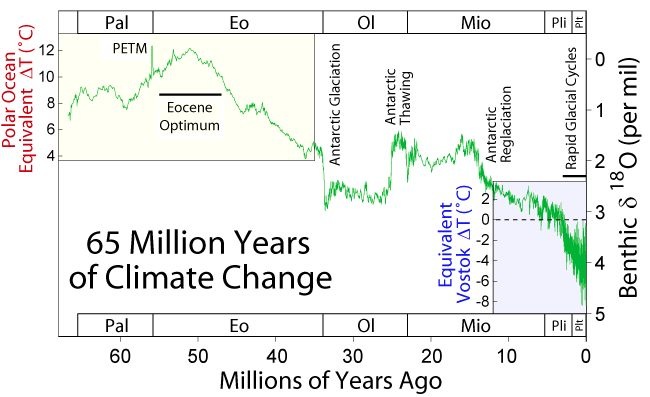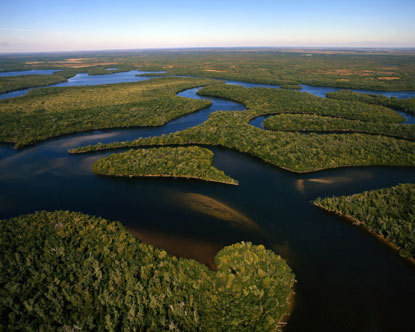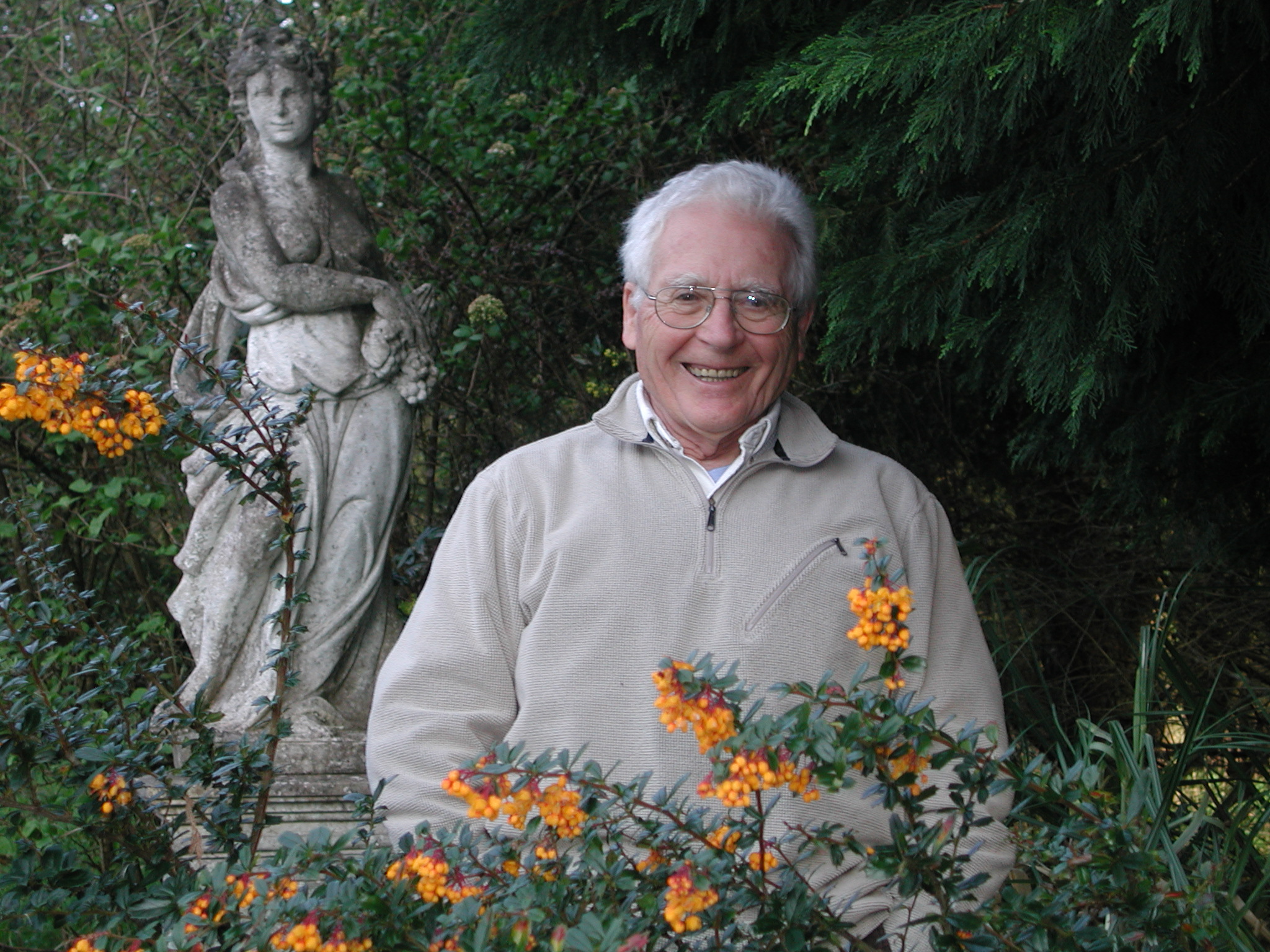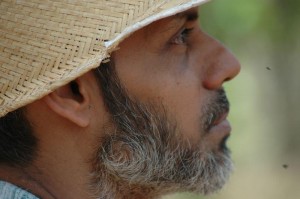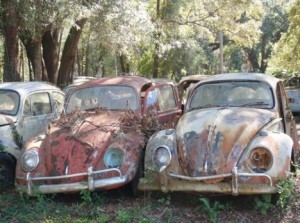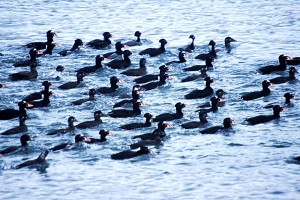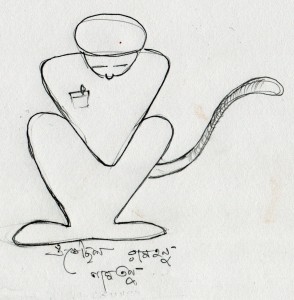“That is the greatest tragedy of today. Brilliant people are pulling us in different directions with regard to how to save the world, the economy, the environment, whatever. And you know what is the tragedy?” Neil asked.
Mabel looked through her binocular. The black crowned night heron remained perched on the tree branch, its neck bent in a U-turn and face tucked inside the feathers on her belly. It offered a compact curled up indistinct image to the viewer. Mabel wished it would look up, so she could see if the bird really had red eyes.
“Whats the tragedy?” She asked.
Neil was standing nearby with the tripod mounted camera on his right shoulder, its lens several times larger than the camera. He held a second camera in his left hand. He had a baseball cap on his head. Over that, he had drawn the hood of is parka and tied it with the string under his chin. The wind was strong, coming in gusts. It was cold. Neil was trying to keep himself warm. He had a pair of blue woolen gloves on his hand, but he would often pull off the right hand glove with his teeth, and take a picture using bare fingers, still holding the glove in his teeth.

He was unlike anyone else Mabel knew personally, with or without his camera gear.
“The tragedy is”, Neil shuffled his feet, attempting to stamp out the cold from his toes. He wanted to get moving. The night herons were unlikely to budge. They had curled themselves into a ball to preserve body heat. They might not know solid state geometry, but they would instinctively curl into a ball when it was too cold, because a sphere offered the least surface area through which a body could lose heat. It did not make sense for them to look up and watch the world when they were not threatened by eagles. They were perched in branches with sufficient cover over and around them. This made it difficult for a hawk or an eagle to try something funny. They were surrounded by smaller perching birds who would raise alarm calls if a hawk ventured near. Long stay in this general area, in proximity of a lot of raptors, has helped them to learn what was safe and what was not.
Even Saw-whet owls dozed in day time in view of people, because they searched a well protected niche where bigger owls or hawks just cold not get in.
“The tragedy is”, Neil repeated, “that these guys are mostly correct – but they do not speak the whole truth. And since they are proposing things that are sometimes contradictory to one another, the public can be thoroughly confused. What is the truth about climate change and what is the right course of action ? People need simple, straight forward solutions. Unfortunately, the experts are not fond of simplifying anything. They merely add more and more noodles into the the soup.”
Mabel smiled. “Noodle soup of climate change ?”
Neil smiled, straightened and tugged her hand. “Lets move on to the fresh water pond ahead. I want to see if there are Mergansers preening like before.”
A year ago, Mabel did not know of the name merganser. She called it a sea-duck, and did not know there were many kinds. But, a year ago, she had not started hanging out with Neil.
Now she knew three kinds – the common merganser, the red breasted one, and the hooded one. And each of them had distinctly different males and females. That made six visually different mergansers one could see around Vancouver, at different times of the year.
She hung the binocular from her neck and took his hand, walking along the wooden rail towards the fresh water pond. There were large fish there that hanged around at the shallows, their tails and upper body visible at times. They were most likely carps. But Neil was interested to check if he could catch any preening merganser. He was in the mood of capturing some of these scenes in HD movies. His recently acquired cameras could take reasonably good movie clips along with still shots. Considering the time he spent looking at birds and nature, it was perhaps natural for him to record as much of it as possible.
It was not convenient to carry separate cameras for still and movies, if you are going to be the only one filming the scene. Besides, the movie cameras did not have the range of high telephoto that his digital SLR and SLT cameras did.
“So what are the main contradictions?” Mabel asked, to keep the conversation going. Its not that she was not interested in the topic. She was. But she had an interest in keeping Neil engaged in issues he liked to ponder on. Neil was a well read man, covering a range of subjects that she found almost mind boggling. In fact, that was one of the reasons she had a crush on him so long ago. The very first time she saw him, at her uncle’s place, he was talking about the Toba super-volcanic explosion that nearly succeeded in causing a total extinction of the human race, at a time when the anatomically modern man was just beginning to step out of east Africa, say seventy odd thousand years ago. Mabel was hooked from that point on.
Neil was the only person he knew, that had actually sent his tissue samples for lab analysis to trace his genetic ancestry, independently through his father’s side and his mothers side. Mabel did not know anybody else who did things like this.
“Well, take folks such as Charles Darwin, Richard Dawkins, Bertrand Russel, Isaac Asimov, Gandhi, Tagore, Copernicus, Galileo, Michael Faraday, Benjamin Franklin, Aryabhatta, James Lovelock, Vandana Shiva, Dalai Lama – take your pick and read these great people. They all are declaring facts of life, and its ebbs and flows, some in stark language, others philosophically – it would appear. And yet, they all are not unified in their thinking or voice, as to what is the best way to deal with difficult issues facing us. Not all of them even identify man as the main agent of climatic deterioration. Take Dalai Lama. He seems to indicate to us that the answer to all ills of the planet as perceptible to man lies within us. We should calm down and contemplate. Then we shall not only find the answer, but also find ourselves to be a lot more at peace with it.”
Mabel watching his frowning face and almost giggled. He looked so engrossed and concentrated. “Anything wrong with that?”
They had reached the side of a longish fresh water pond. Neil put down his tripod on the ground and watched the scene in front of them through the viewfinder of this camera.
“There are external changes coming to this planet earth which is going to be devastating to a lot of living creatures. Closing eyes and lowering out metabolism can help us stay calm, but it is not expected to out trillions of tons of carbon back underground and refreeze the ice caps and recreate the glaciers.“
Neil scanned the water and the bushes at the edge of the water. With some luck, her might get to see a muskrat or a mink. Once he had even seen a family of river otters, though that was at a different pond.
“Hmm, well, God is supposed to have created Man after his own image.” Mabel said, half jokingly. “But of course, you do not believe in that, and most feminists of today might even dispute that God was strictly a male.”
Neil chuckled. “Yes I am a non-believer. But I can borrow God time to time, if it makes a good slogan. For example : God created man. Man created junk. How do you like that ?” He chuckled.
Mabel widened her eyes in mock horror. “Its like saying God created junk indirectly. I think my grandma would have been very disappointed in you.”
“Well, I would perhaps had managed to win her over somehow, except for one thing though. My skin is not white.” Neil laughed.
Mabel laughed too. It was a kind of a joke with them. Her Grandma, all those years ago, had apparently almost fallen in love with an Italian helper who reportedly had a darker or burnished skin. She was not allowed to marry him, or even see him, once her distant romance got to me known. The reason for the disapproval had less to do with the man’s standing in society, and more to do with the fact that he was a bit too dark to be purely European. They suspected him to have Arab or African or some other contaminated blood. She did not care, but her folks did, and that was that.
“My grandmother would have approved of your skin, but not your lack of religion, I think.”
Neil smiled. His eyes went back to the mallards that were flying fast overhead heading out to the far field across the pond. A pair of wood ducks floated lazily on the water far from them. He wished they’d swim closer.
Canada was far to the north, and also had a lot of land and a lot of water. Canada was likely to be relatively less affected by a hotter climate. He wondered if there still would be wood ducks and mergansers around in these areas, if the earth temperature rose by several degrees and the ocean currents carried a lot less nutrient along the seabed between the mainland and Vancouver island.
“What are you meditating about?” Mabel nudged him. “Don’t worry, I am not going to tell Grandma that you are an atheist. I wont even tell you are a Hindu by berth.”
“Ohh I am not worried about that. I was thinking if I meet up with Dalai Lama some day, I should be able to have a good chat with him. He is quite a clever chap, you know?”
“I can guess, though I haven’t read his books”.
“Well, even so, there are things we just cannot solve by merely meditating. However, it is possible that deep introspection helps find the answer to difficult problems. Those answers, I am afraid, are all rather ugly. I might tell Dalai Lama that evading unpleasant answers is same as telling a lie, indirectly. The world has crossed the threshold on climate change. We are past the point were answers could be pretty. And yet, we are in denial of the crisis at hand. We only wish to paint a rosy picture and a market oriented solution to everyting. Americans like to call that a win-win situation.”
There were a pair of hooded mergansers. No, there were two pairs. But they were a bit far away, swimming in their general direction though.
“Its not going to be a win-win, right ?”
“Uhh huhh. I feel pretty certain it will look more like a lose-lose, no matter how one looks at it. But the world hates lose-lose solutions. It ranks of defeatism.”
Mabel picked her binocular up. There were a handful of Canada geese honking like crazy in the distance. She cold also see a few common merganser in the distance. And then there were at least a pair of wood ducks in the water. Neil had seen them too, and was clicking off a shot or two using his camera with the long lens.
“I don’t like defeatism either.”
Neil smiled. “Nobody likes it. Thats one of the problems though. A very major problem. The world remains in denial. As a result, instead of taking steps to soften the damage and prepare ourselves so the survivors can better face the challenges of the future, we are still engaged in day dreams that the threat of damage can be eliminated completely, or that there is no threat in the first place.”
Mabel nodded. Whatever the fate of the planet might come to in a generation or two, she felt happy to be with Neil. Hopefully, that would last long enough for them.
Neil pointed up. High up on a spruce tree, a solitary adult bald eagle was surveying his domain. It was at the top most branch, with an unobstructed view all around. It was typical of bald eagles to sit high up and in plain view. They had no natural enemy up there.
The wind was strong, and cold. Mabel focussed her binocular on the bird. The wind was parting the feathers at the back of its neck. It still looked so regal, with its snow white head and deep yellow large hooked beak.

And as she watched, the bird turned its head skyward, opened up its beak and let out a series of high pitch trills. It was distinctly different from the low frequency and louder quacks of the ducks in the water. The bird repeated the act, turning its head in all directions, and letting out its shrill call.
Mabel was mesmerized. She had seen bald eagles before, but had not ever heard it call out.
“Did you hear that ?” She hushed excitedly.
“Shhhh” Neil whispered back “I am filming it”
They stood side by side, she looking at the bird through her binocular, and he looking at it through his camera. He had a swinging head Gimbal to connect the camera to the tripod. This allowed him to swing the camera around in all directions rapidly and still have the camera more or less balanced through the centre of the tripod. This allowed the camera to hold its position at any angle without the need for tightening screws to lock the camera at each setting. Neil was happy with it, and was taking a video of the eagle.
Seconds passed by, then minutes. Apart from the quack of the ducks and the occasional shrill call of the eagle, the only other noise was of the wind buffeting them and swaying the tree branches around.
It was a few minutes before they decided that would be enough, and turned their attention elsewhere. The eagle maintained its tree top vigil.
“You know, I looked up Dyer’s Climate Wars. I might end up buying it.”
Neil looked her her. She seemed serious. “Its a very good book. Its also quite stark in its prediction. Gwynne Dyer does not mince words. Thats one reason I like his analysis. Not everyone had stomach to read what appears unpleasant. Thats the reason some folks avoid James Lovelock too. You should read that book. I can loan you my iPad so you can read it there without having to buy a copy. He is good.”
“I know. I read a few pages from your iPad that day. In that scenario, Dyer was talking about what happens to Russia, in 2019.”
Neil nodded, walking on.
“I mean, it was a hypothetical scene, I think. Was it not ?”
“Of course. Any prediction of the future has to be hypothetical. There are any number of things that could happen and alter the course of history.”
“Yes. Anyhow, I found those pages really worrisome. A little scary even. I mean, 2019 is only seven years into the future. Do you think the polar ice cap is going to disappear by then?”
Neil frowned as he considered the question. “I don’t know. There are some that predict the arctic ice cap to vanish in five years, at least in summer. Five or ten years – whats the difference? The damage is done. It took 35 million years for the polar ice cap to reach its pre-industrial maximum size. It took us a few hundred years to kill it. But the arctic sea ice is not the only worry. The same thing is happening to the Antarctic ice sheet too, though not as rapidly as the arctic one. This is a hard fact that is not being told properly to the masses.”
Mabel remembered Green Peace activists that were based in british Columbia. The movement had started from Vancouver. It was a pity, she felt, that Canada was rejecting ideas of carbon emission control, merely to promote the relatively dirty industry of extracting oil from the tar sands of Alberta.
“It makes you skeptical of our leaders, no?” She asked
Neil nodded and snaked his arms around her waist. Mabel was not exactly skinny. He liked her fleshy hips and the way his palm could rest on her curves. He liked the muscle and tissue mass of her upper torso, the curve of her breasts and the arc of her neck. He had come to like her slightly roundish face that appeared full of blood. She is not a freckled red head, but close to one. He wondered if she had any Irish blood in her.
He leaned over and kissed her cheek, then got conscious of being in the open, though there was nobody around other than a bunch of birds. If the birds noticed their display of affection, they showed no sign of it.
“This is one reason I tend to be skeptical of most leaders as well as most climate scientists and sustainable living gurus. Some of them just don’t know enough and yet chose to talk. Some have sold themselves to the devil, and hence talk through forked tongue. But there are some scientists that know the truth, and yet will not talk about it because it is too bitter a pill. I particularly dislike them. They are afraid to call a spade a spade because it might upset the crowd and shake the public out of its complacency.” Neil spread his hands in frustration.
They had walking along the agricultural field, a vast stretch of land plowed in parallel lines, circle by rows of trees and their periphery. They could see groups of Canada Geese flying over the trees to settle on a field half a mile away from them.
A small group of trumpeter swans went flying across their view, in single file, their long necks stretched forward, their nosy calls alerting the world about their passage.
Neil stopped, put his tripod on the ground, turned his camera, focussed and clicked a few stills of the group of swans in against the grey sky.
“These are all adults, I think. I have seen them with juveniles before. The young ones have a shade of grey on them.”
Mabel too watched them through her binocular, till they disappeared over the tree tops.
The walkway came to a fork. To the left were miles of reeds leading to the pacific ocean. To the right was a wooden shed that served as a blind for watching water birds.
They turned left and headed towards the edge of the reeds overlooking the ocean. They could hear faint calls of the snow geese. A female northern harrier went on its rounds circling low over the reeds, the ponds and the fields, often banking this way or that, swooping low and then rising back up. It passed over head. Neil turned his camera up and followed the bird, clicking a few successful shots of the bird and then exclaimed in frustration as it ventured too close and its rapid movement cause Neil to lose the bird from his high power telephoto lens. He had to take his eyes off the camera and search the sky to locate the bird, and train his camera again.
Mabel watched him, and the bird, by naked eyes. She too had a problem following this bird with a binocular, especially when it gets close.
The bird, apparently oblivious to the pair of humans, eventually swerved further and further away at the edge of the ocean. Neil shut off the camera for now, and lifted the contraption again on his shoulder. His second camera hung off his neck.
Mabel joined him, pulling his hands back on her waist, and walking hip to hip. It might be a bit childish, but she still had it in her, and he was, perhaps belatedly, enjoying a bit of it.
“My brothers are in denial about the change of climate” Mabel commented. “They know it is happening, but do not believe it will be something we need to worry about for many centuries. They both like the idea of developing oil and gas industries in Canada. More jobs, you know ?”
Neil nodded. He knew. Perception of more jobs was one of the root causes of the trouble, in his mind. But then, he did not have any easy solution either. No solution appeared easy to him. This was in fact part of the reason the issue was left untouched by leaders.
“I know. Even pundits are biased.”
“Pundits?”
“Sure. Pundits are no better than you and me.” Neil retorted, only half in jest.
They noticed the coot and stopped. An American coot cut across their path and headed for the shallow fresh water pond on the other side, its head bobbing as it stepped its way purposefully over the short grass, its roundish black body surprisingly agile. It even let out a few clicking sounds, perhaps to tell Mabel and Neil that it was keeping an eye on them, so better not get any closer.
The sun dipped another notch over the western sky, towards the low hills sticking out of the ocean, and the layers of clouds overing around the mountain tops – those famous low clouds of March that hung around the horizon to turn an average sunset into a spectacular one.




